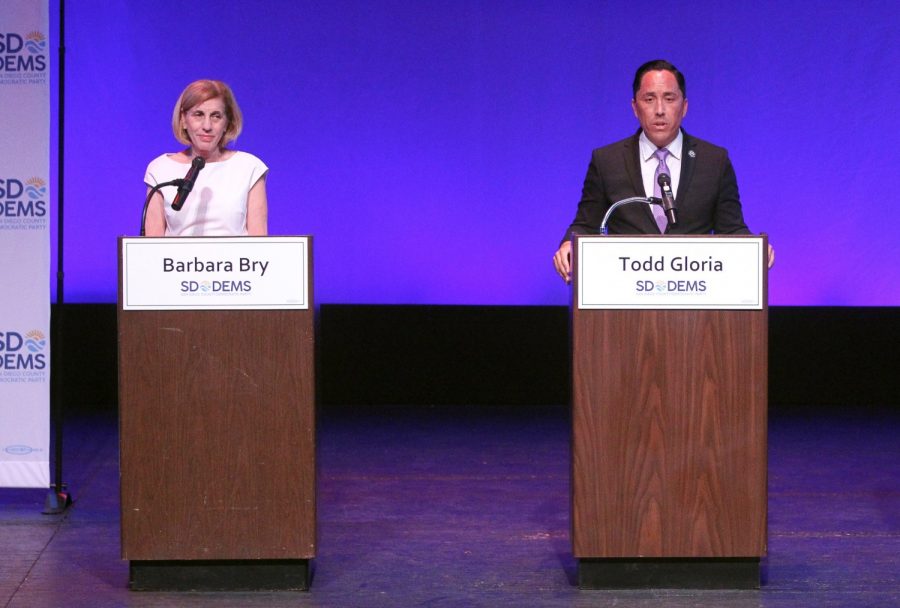With the race getting tighter toward filling the seat of San Diego mayor, NBC 7 hosted a live debate between both democratic candidates prompting notable clashes on the city’s budget and its housing and homeless crisis.
One of the main topics during the debate was on San Diego’s economic recovery and councilwoman and former entrepreneur Barbara Bry placed an emphasis on integrating growing industries into the city’s economy, specifically in communities of color where fiscal decline has done the most damage.
“During the pandemic, (high tech and biotech industry) continued growing… I want to make sure every community benefits from this,” said Bry. The councilwoman said that she plans to include a “school engagement coordinator” in her mayoral office, which will expand industry opportunities, such as internships and employment, to neighborhoods “south of (Interstate 8)” because the people in these communities have not had access to these kinds of jobs.
With this plan, she believes the expansion of the high tech and biotech industry will stimulate revenue in the city, allowing smaller businesses to thrive as well. Based on the same industrial principles, Bry wants to implement universal internet access for small businesses allowing them to possess the “digital tools to succeed.”
Along with COVID-19, Bry ties economic issues to her opponent, Assemblyman and former Councilmember Todd Gloria, for not upholding what she calls “fiscal discipline.” She attributes these issues to the careless use of San Diego’s budget and Gloria’s “empty promises.” The assemblyman disagreed with her statements when he explained his plans for economic recovery.
“I think it is important for your viewers to know that prior to the pandemic and the resulting recession, the city was already running a significant budget deficit of over $70 million which shows that fiscal discipline has not been on display over the last four years at city hall, quite the contrary,” said Gloria.
Prior to this statement, Gloria demonstrated a tone of confidence on facing the city’s budget deficit, explaining that he served as the city’s budget chair during the 2008 recession and that he turned those “deficits into surpluses, and fill our reserves.”
The assemblyman plans to use those surpluses as an economic cushion to face the deficit as mayor, which will likely be “over $300 million,” according to debate co-host Danny Freeman. Gloria’s approach focuses on the city’s cost savings. He says that he too wants to fix carless purchases by the city and wants to have an “open and collaborative approach” with small business owners to reduce spending.
“I will work with employees to figure out cost savings that we can achieve to try and minimize impacts to neighborhoods and to residents… make sure short-term vacation rentals are paying their fair share of taxes… making sure we don’t engage in disastrous land deals like the purchase of an indoor skydiving facility without an appraisal for roughly twice what it was worth.”
Gloria’s disapproval on the city’s costly purchase of an indoor skydiving facility in 2018 — which is intended to serve as a center that steers homeless people off the street — was a response to Bry’s arguments against his involvement in the 2016 real estate purchase of the office building on 101 Ash Street, another topic which was debated.
The city purchased a lease-to-own deal on the office building with the intent of making it a new work space for city employees. This purchase happened with no prior inspection of the building which led to the discovery of a series of problems. These will cost taxpayers around $274 million to $300 million to fix, said NBC 7 investigative producer Dorian Hargrove on NBC 7 show “Politically Speaking.”
Gloria’s approval of the purchase during his time as a city councilman has been a core element in Bry’s campaign and an example of the “fiscal discipline” she claims to be missing.
During this topic of debate, Bry presented page one of the building lease documents.
“Page one indemnifies the seller from all liability, no rational buyer would sign anything like that,” said Bry. “What was happening back then — it seems that special interests were pushing the purchase of this building for different reasons… Mr. Gloria, you are responsible for the situation the city is in today.” Her argument went to the extent that this was a criminal act committed by the assemblyman.
“Moody’s, which is a credit rating service, has written a lengthy report about the transaction, and believes that there may have been criminal activity and fraud involved,” said Bry.
Gloria’s rebuttal detailed Bry’s further expansion of the problematic purchase, saying that she “broke that same building.” He said that of the $40 million that was intended to be saved with the real estate purchase, $30 million was used by Bry to remodel the building.
“Councilmember Bry did not ask questions about why this was necessary. She voted to plow $30 million more dollars into a building that she now says is a ‘complete lemon,’” adds Gloria.
Gloria concluded this argument with a plan to deconstruct the San Diego’s real estate department
“Point is all of them have been bad real estate deals, so the question is where do we go from here?” said Gloria. “This administration clearly cannot manage real estate, the next administration can only do better.”
Another topic of disagreement was their plans for the city’s housing crisis. Bry is an opponent of Measure A, which proposes a property tax increase on San Diegans to raise $900 million funding low income housing development. The councilwoman supports local control over zoning and said that measures such as this and those who support it will “take away the ability of San Diegans to determine what gets built in their neighborhoods.”
Gloria criticized the councilwoman’s language on this topic, and claimed that it is furthering political division.
“She is not bringing people together. The fact of the matter is, when my opponent uses terms like ‘there goes the neighborhood,’ or ‘they’re coming for your homes,’ these are dog whistles to people. They know exactly what she is talking about, it is exactly why the president uses the same king of rhetoric,” said the assemblyman.
The topic of homelessness prompted the councilwoman to identify what she calls an “empty promise” made by Gloria. Bry again held up another piece of evidence — a data sheet from the non-profit Downtown San Diego Partnership — showing that from the time that Gloria made promise to lower chronic homelessness in 2012 as a councilman to when he joined the Assembly in 2016, the number of unsheltered homeless individuals went from 593 to more than 1,400.
The assemblyman’s plan to attack the homeless crisis calls for three specific elements: partnering with the county, building more housing, and data and transparency. Gloria believes that there needs to be a combination between the county’s health and human service agency and the city’s housing commission to help solve this problem.
A topic that the two candidates agreed on was racial justice and policing. Bry and Gloria were both clear that they do not support defunding the police, but do support Measure B, which creates a Commission on Police Practices; those in the commission would be appointed by city council to investigate and subpoena witnesses involved in deaths by police officers and complaints made against them.
According to a San Diego Union-Tribune/10News SurveyUSA poll released on Oct. 6, both candidates are nearly neck and neck in the mayoral race, with Gloria at a slight leading in front of Bry at 39%to 38%, leaving nearly a quarter of likely voters undecided.
If Bry wins this election, she will be one of three female mayors for San Diego, the last being in 2000.
If Gloria wins this election, he will be the first San Diego mayor with Latino, Filipino and Native American heritage and who is openly gay.




